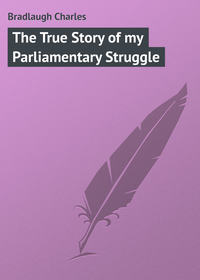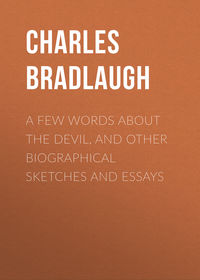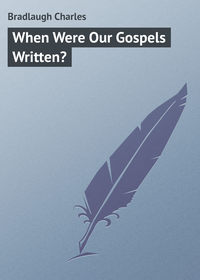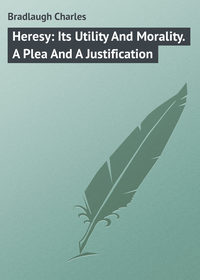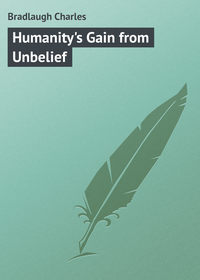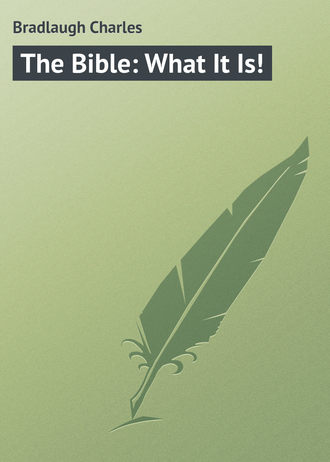 полная версия
полная версияThe Bible: What It Is!
'It is very unlikely that the Israelites knew anything about the bedstead of King Og until then. In the reign of David, five hundred years had passed since Og lived, and his bedstead had consequently become an object of curiosity; like the great bed of Ware, which is still shown in that town, though only three hundred years old. It is hardly possible that Moses knew anything about this bedstead of King Og, afterwards so famous.'
Verse 11. 'Is it not in Rabbath, of the children of Ammon?' This could scarcely have been written by Moses, for the reasons just stated.
Verse 24. 'What God is there in heaven, or in earth, that can do according to thy work?' This is a strange phrase from the lips of a man who only believed in one God.
Chapter iv., vv. 21 and 22. The Lord said, that not one of the Israelites, except Caleb, and his seed, should enter the promised land (vide Numbers, chap, xiv., v. 24). Yet here Moses says, 'I must not go over Jordan, but ye shall go over, and possess that good land.'
Verse 40. 'The earth, which the Lord thy God giveth thee, for ever.' The earth, I suppose, means Judea only, and this has not been held by the Jews to the present day, much less for ever.
Verses 41 and 46. 'On this side Jordan,' the Douay reads, 'Beyond the Jordan.'
Chapter v., vv. 12 to 15 (see page 57).
Verse 22. 'These words the Lord spake… with a great voice, and __he added no more,' Yet in Exodus, chap, xx., vv. 22 to 26, and in the following chapters, he adds a great deal more.
Chapter vi., v. 5. 'Thou shalt love the Lord thy God with all thine heart, and with all thy soul, and with all thy might.' Is it possible that the Jews could love a Deity, whom they had only seen amongst smoke and fire, as a pillar of cloud by day, and as a pillar of fire by night; who had led them from the flesh-pots of Egypt into the sterile sandy desert of sin? If love is a necessary consequence of punishment, the Israelites would, of course, love very strongly; but I submit it is utterly impossible they could love a God who told them he was a jealous God, whose anger might be kindled against them, and who might destroy them from off the face of the earth; who had tormented them with various plagues, for uttering complaints which they could scarce avoid. Hunger and thirst would tempt the most contented men to murmur; and yet for these murmurings they had been terribly dealt with.
Chapter vii., v. 2. See Exodus, chap, xxxiv., v. 6., Deuteronomy, chap. iv., v. 31, Psalms, xxxiii., v. 5, ii., v. 1, cxvi., v. 5, cxiv., v. 8, 2 Chronicles, chap, xxx., v. 9, Nehemiah, chap, ix., v. 31, 9 Micah, chap, vii., v. 18, 1 Corinthians, chap, xiv., v. 33. I will make no further comment than this, that it is utterly impossible a God of mercy, long suffering, gracious kindness, and goodness, could have given such a command as this to his people: 'Thou shalt smite them, and utterly destroy them; thou shaft make no covenant with them, or show mercy unto them.'
Chapter viii., v. 4. 'Thy raiment waxed not old upon thee… these forty years.' So that during that time a continual miracle must have been worked with respect to the clothing of the Jews, although, if we admit any one miracle, of course we, to a great extent, if not altogether, lose our right to object to any other. I am not aware whether it was from wearing their clothes for so lengthy a period that the Jews obtained the epithet of 'old clothesmen of the world.' Perhaps the editor of Notes and Queries may deem the point worthy of investigation.
Verses 7, 8, and 9. This description cannot apply to Judea, and there must be some error, as the digging 'brass.' Brass is an alloy of copper and zinc; the proportions varying, according to the required colour. It is made by heating copper plates in a mixture of native oxide of zinc. It is not true that Judea was 'a land wherein thou shalt eat bread without scarceness,' as various famines are mentioned. See Ruth, chap, i., v. 1, 2 Samuel, chap, xxi., v. 1, 1 Kings, chap. xviii., v. 2, 2 Kings, chap, vi., v. 25, 2 Kings, chap, viii., v. 1, and 2 Kings, chap, xxv., v. 3.
Verses 19 and 20. 'If thou do at all forget the Lord thy God, and walk after other Gods, ye shall surely perish.' The Jews were often idolatrous, and yet have not perished.
Chaps, viii. and ix. By these chapters it is certain that the bulk of the Israelites, who were to pass over Jordan into Canaan, had resided in Egypt, and provoked the wrath of the Lord on many occasions. The Lord must, therefore, have changed his mind, and rescinded the decree made by him in Numbers, chap, xiv., v. 23.
Chapter ix., v. 1. 'Fenced up to heaven.' These fences must have been very high; the carpenters built tall fences, and archers drew long bows, in the time of Moses.
Verse 16. On page 62, I omitted to notice that casting a metal calf is not a very easy operation to be performed by a wandering and ignorant people, in a desert without furnaces or mechanical aid.
Verses 9 and 18. The pretension here made by Moses is, that he fasted continuously eighty days and eighty nights, and 'neither ate bread nor drank water,' during that period. This is a very long fast, especially when we consider that Moses preserved his usual strength and activity, walked down the mountain, carrying two tables of stone, dashed them under his feet, etc There are several cases on record, in which human beings, affected by disease, have preserved life during a forced abstinence; the teeth, in one instance, being quite closed for a very considerable period; but in all the cases I have read, some nutriment was administered in a fluid form, with a quill, or feather, or otherwise; in some, the patient has been in an almost cataleptic state, and I do not think that, in any case, the person fasting has been known to retain all his powers of mind and body unimpaired. There is nothing said about this fast in Exodus.
Verse 20. Neither is there any mention whatever of this in the Book of Exodus.
Chapter x., v. 6. 'Mosera. There Aaron died, and there he was buried.' According to Numbers, chap, xx., v. 28, Aaron died and was buried on Mount Hor.
Verses 6 to 9. These verses seem to have been inserted without regard to the context; they have no connexion with the rest of the chapter, which would read more coherently if read from v. 5 to v. 10, omitting the four intermediate verses. In v. 8, the words 'until this present day,' would denote a considerable lapse of time from the death of Aaron.
Chapter xi., w. 23, 24, and 25. This has never been fulfilled, and the Christian will urge that it is not fulfilled because the Israelites have been disobedient. But this can scarcely be admitted, as neither blessing nor curse has been accomplished.
Chapter xii., v. 15. This is a contradiction of Leviticus, chap, xvii., vv. 3 and 4.
Verses 18 and 27. Here the people are allowed to eat a portion of the tithes and burnt offerings. While by Numbers, chap, xviii., v. 24, they are confined to the Levites.
Chapter xiii. Here Moses says, if 'a prophet' arise, and his prophecy come to pass, 'that prophet shall be put to death.' Can we, therefore, wonder that the Jews put Jesus to death, the more especially as he endeavoured to introduce a new form of worship, and new doctrines amongst them.
Chapter xv., v. 4, contradicts v. 11. The former stating that there shall be a time when 'there shall be no poor amongst you;' while the latter declares that 'the poor shall never cease out of the land.'
Chapter xviii., v. 8. What is a Levite's patrimony? In Numbers, chap, xviii., w. 20 to 24, it is expressly stated that the Levites should have no inheritance in the land.
Verses 10 and 11. On page 59, I have remarked upon the subject of witches and wizards, and now ask, can we have a stronger argument against this book than is contained in these verses? Voltaire writes thus upon enchantments: —
'Is not a large portion of the absurd superstitions which have prevailed, to be ascribed to very natural causes? There are scarcely any animals that may not be accustomed to approach at the sound of a bagpipe, or a single horn, to take their food. Orpheus, or some one of his predecessors, played the bagpipe better than other shepherds, or employed singing. All the domestic animals flocked together at the sound of his voice. It was soon supposed that bears and tigers were among the number collected. This first step accomplished, there was no difficulty in believing that Orpheus made stones and trees dance.
'If rocks and pine trees can be thus made to dance a ballet, it will cost little more to build cities by harmony, and the stones will easily arrange themselves at Amphion's song. A violin only will be wanting to build a city, and a ram's horn to destroy it.
'The charming of serpents may be attributed to a still more plausible cause. The serpent is neither a voracious nor a ferocious animal. Every reptile is timid. The first thing a reptile does, at least in Europe, on seeing a man, is to hide itself in a hole, like a rabbit, or a lizard. The instinct of man is to pursue everything that flies from him, and to fly from all that pursue him, except when he is armed, when he feels his strength; and, above all, when he is in the presence of many observers.
'The charming of serpents was considered as a thing regular and constant. The sacred Scripture itself, which always enters into our weaknesses, deigned to conform itself to this vulgar idea.
'"The deaf adder, which shuts its ears that it may not hear the voice of the charmer."
'"I will send among you which will resist enchantments."
'"The slanderer is like the serpent, which yields not to the enchanter."
'To enchant a dead person, to resuscitate him, or barely to evoke his shade to speak to him, was the most simple thing in the world. It is very common to see the dead in dreams; in which they are spoken with, and return answers. If any one has seen them during sleep, why may he not see them when awake? It is only necessary to have a spirit like the Pythoness; and to bring this spirit of Pythonism into successful operation; it is only necessary that one party should be a knave, and the other a fool; and no one can deny that such rencontres very frequently occur.
'The famous Witch of Endor has always been a subject of great dispute among the fathers of the Church. The sage Theodoret, in his sixty-second question on the Book of Kings, asserts, that it is universally the practice for the dead to appear with the head downwards; and that what terrified the witch was Samuel being upon his legs.
'St. Augustin, when interrogated by Simplicion, replies in the second book of his questions, that there is nothing more extraordinary in witches invoking a shade, than in the Devil transporting Jesus Christ through the air, to the pinnacle of the temple, on the top of a mountain.'
Chapter xix., vv. 2, 7, and 10. Here three cities of refuge are directed with a condition that three more may afterwards be added; while in Numbers, chap, xxxv., vv. 13 and 14, six are directed unconditionally.
Chapter ix., vv. 16, 17, and 18. By this command to 'save alive nothing that breatheth,' we may judge of the mercy and loving kindness of the God of the Jews. Why were the Hittites, the Amorites, the Canaanites, the Ferrizites, the Hivites, and the Jebusites, to be mercilessly slaughtered? I am answered that they were idolaters. So were the Jews. And even if they were idolaters, the Omnipotent Deity had permitted them to become so, without giving them the benefit of any revelation from himself or the chance of listening to any of his prophets; in fact, by preferring the Jews, he must, to some extent, have neglected these unfortunate nations; and can it be wondered that such barbarous nations worshipped false Gods in those dark ages, when in the enlightened latter moiety of the nineteenth century, in the highly civilised country of England, there are more sects than there are books in the Bible; each drawing from that Book entirely different doctrines as to the Deity, and each declaring that theirs only is the true faith, and that all the others merit damnation (vide the Reverend preachers of Surrey Gardens on the one hand, and of Exeter Hall on the other)?
Chapter xxi., w. 10 to 14. According to this highly moral Book, if one of the Jewish warriors perceived a beautiful woman amongst the captives, he could take her home, keep her until he grew tired of her, and then desert her; he was only prohibited from selling her.
Verse 15. Polygamy is evidently a recognised institution amongst the Jews. In the present day, we are told that polygamy amongst the Mormons is an evidence of the grossly sensual character of Mor-monism.
Chapter xxii., w. 9, 10, 11. These verses seem to me to be too trifling and absurd to have a place amongst the ordinances of the infinite Deity.
Chapter xxiii., v. 3. An Ammonite, or a Moabite, shall not enter into the congregation of the Lord, even unto their tenth generation. Yet David was only the third, and Solomon the fourth, generation, from the Moabitish woman Ruth (see Ruth, chap, iv., w. 21 and 22). Verses 1 to 6 seem positively unjust. Why should ten generations suffer; they did not choose their birth-place – whether Ammon or Judea.
Verses 13 and 14. I should not notice these verses, were it not for the gross absurdity of the 14th. The 13th contains a very useful sanitary regulation, although hardly worthy of a place in a revelation from the infinite and eternal ruler of the universe; but to suppose that God would perceive the 'unclean thing, and turn away,' is really too ridiculous to need further remark.
Verse 18. Why is a dog an abomination to the Lord? Dogs are of all animals the least likely to be an abomination to any one. They are more faithful to man than any animal except, perhaps, the horse. They possess better organisations than the majority of the brute family, and one is at a loss to understand the reason for this dislike to a dog on the part of the Deity, especially when we remember that the same Deity is alleged to be the creator of the dog, and of all other animals.
Verses 19 and 20. All men ought to be considered as brethren. These verses are further evidence, if any were needed, that this is not a revelation from 'one God and Father of us all;' if it were, he surely would teach that all are brethren, and that none should be treated as strangers. Until we can call each man brother, and can set aside class distinctions, we shall never be able to realise a good state of society.
Chapter xxiv., v. 2. In Leviticus, chap, xxi., v. 7, it is said, 'Neither shall they take a woman put away from her husband.' These contradictory precepts can scarcely be from the same man; still less can they be from the same God.
Verse 16 has been referred to on page 56.
Chapter xvvii, vv. 2 to 8. Here is a command for the elders to write 'all the words of this law,' and it is very clear that whether Moses, or any one else wrote, that it would be utterly impossible for a few men to carry the ark about, if it were filled with as many stones as would be required to contain the whole of the Pentateuch. The plastered stones would only suffice for a stationary people. Dr. Giles observes: —
'That the Hebrew legislator should deliver to his countrymen two tables of stone on which the principal heads of the law were engraved, is consistent with all the information which history supplies concerning those early times and the practice of other nations. But if we suppose, a book of such length and bulk as the Pentateuch to have been given at the same time to the Israelites, what becomes of the two tables of stone? Where was the necessity that these, also, should be given? It was not that they might be set up as monuments visible to the whole people, and as exponents of the heads of a law, which the written books would develop more fully, for the two tables of stone were never set up at all; they were kept in the ark of the covenant, and there is no mention made of their ever being taken out, not even when the temple of Solomon was built, when they might, with propriety, have been set up in some public place if this had been the use for which they were originally designed. But no such use is hinted at by the writer, nor were they originally given by God for such a purpose, as is manifest from their size, for when Moses came down from the Mount, he held the two tables in his hand, which he could not have done if they were of the usual size of monuments made to be set up in public.
'But the supposition that the two tables of stone were intended to be set up as monuments is refuted by the fact that other stones were actually set by Joshua, according to a command given by Moses, and that on them was inscribed a copy of the law of Moses. The original injunction of Moses is found in the 27th chapter of Deuteronomy, vv. 1-8.
'"And Moses, with the elders of Israel, commanded the people, saying, 'Keep all the commandments which I command you this day. And it shall be on the day when ye shall pass over Jordan unto the land which the Lord thy God giveth thee that thou shalt set thee up great stones, and plaster them with plaster: and thou shalt write upon them all the words of this law when thou art passed over, that thou mayst go in unto the land which the Lord thy God giveth thee – a land that floweth with milk and honey, as the Lord God of thy fathers hath promised thee. Therefore, it shall be when ye he gone over Jordan that ye shall set up these stones which I command you this day in Mount Ehal, and thou shalt plaster them with plaster. And there shalt thou build an altar unto the Lord thy God, an altar of stones: thou shalt not lift up an iron tool upon them. Thou shalt build the altar of the Lord thy God on whole stones: and thou shalt offer burnt offerings thereon unto the Lord thy God: and thou shalt offer peace offerings, and shalt eat there and rejoice before the Lord thy God. And thou shalt write upon the stones all the words of this law very plainly."
'The fulfilment of the command is related in the 8th chapter of Joshua, vv. 30-32: —
'"Then Joshua built an altar unto the Lord God of Israel in Mount Ebal, as Moses, the servant of the Lord, commanded the children of Israel, as it is written in the book of the law of Moses, an altar of whole stones, over which no man hath lift up any iron: and they offered thereon burnt offerings unto the Lord and sacrificed peace offerings. And he wrote there upon the stones a copy of the law of Moses, which he wrote in the presence of the children of Israel. And all Israel, and their elders, and officers, and their judges stood on this side the ark and on that side before the priests the Levites, which bare the ark of the covenant of the Lord, as well as the stranger, as he that was born among them; half of them over against Mount Gerizim, and half of them over against Mount Ebal; as Moses, the servant of the Lord, had commanded before, that they should bless the people of Israel. And afterwards he read all the words of the law, the blessings and cursings, according to all that is written in the book of the law. There was not a word of all that Moses commanded, which Joshua read not before all the congregation of Israel, with the women, and the little ones, and the strangers that were conversant among them."
'This narrative is remarkable, for it commemorates a public solemnity held for no other purpose than that the laws of Moses might be impressed on the minds of the Jewish people. The writer also tells us that it was held in accordance with the book of Moses, and yet he does not tell us that the book of Moses was produced on that occasion, though we are to suppose that it was in existence. Yet something is then done which seems to prove by implication that there was no such book at all at that time. Joshua is said to have engraved on certain stones a copy of the law of Moses, and afterwards to have read all the words of the law, and the concluding paragraph relates that "there was not a word of all that Moses commanded, which Joshua read not before all the congregation of Israel." Must we, then, suppose that the whole of the Pentateuch was inscribed on those stones by Joshua? What could be the use of inscribing the historical parts of the Pentateuch on those stones, or reading them afterwards to the people if the object was simply to admonish them that they should observe the law of Moses? It is more probable that an inscription, much shorter than the whole of the Pentateuch, was carved upon those stones, and as no mention is made of any book at all on the same occasion, we have a negative proof that no such book was in existence at that time.
'The delivery of the two tables renders it unlikely that any other writing was bequeathed by Moses to the Israelitish people, particularly as the age in wnich Moses lived precedes by many centuries the times in which books, as far as we know of them, can be proved to have been written.'
Chapter xxviii. The remarks on page 61 apply more forcibly here. In this chapter Moses exerts himself to the utmost to depict the blessings attendant upon obedience to the laws; he uses the most expressive words he can command to define the rewards which God will give his chosen people, but he never dreams of a crown in heaven, or of an eternal life of happiness after death. If man possessed an immortal soul in the days of Moses, it is certain that Moses was ignorant of its existence. When threatening the people with terrible punishments if they disobeyed the laws, when using terms which would degrade the Deity into a cruel and horrible monster, when speaking of events which, if they had occurred, would have made life a burthen, when using the most vindictive and diabolical curses, Moses never hinted at a hell fire in which men were burned 'for ever and ever,' by the fire which is never quenched, and, at the same time, further tormented by the worm that never dieth. The doctrines of the existence of a soul, and of its punishment or reward in a future state, were entirely unknown to the Jewish lawgiver.
Verse 23. Here the heaven is to be 'brass,' and the earth 'iron.' In Leviticus, chap, xxvi., v. 19, the heaven is to be 'iron,' and the earth 'brass.'
Verse 58. Is evidently written long after the time of Moses, because at the commencement of his oration, Moses tells the elders to write 'the words' after they have crossed the Jordan, and this verse, therefore, could have formed no part of the original speech of Moses.
Verse 61. The same applies here.
Chapter xxix., v. 23. 'Admah and Zeboim, which the Lord overthrew in his anger.' We have no account of this anywhere in the Pentateuch. It has been assumed (but I am unable to learn on what ground) that these cities were destroyed at the same time with Sodom and Gomorrah.
Verses 25 and 28. Dr. Giles observes that in these verses 'are described the evils that should happen to the Israelites in case of their not observing the law which had been given by Moses: —
'"Then men shall say, Because they have forsaken the covenant of the Lord God of their fathers which he made with them when he brought them forth out of the land of Egypt For they went and served other gods, whom they knew not, and whom he had not given unto them. And the anger of the Lord was kindled against this land, to bring upon it all the curses that are written in this Book. And the Lord rooted them out of their land in anger and in wrath, and in great indignation, and cast them into another land, as it is this day."'
'Here is an allusion to the great downfall of the first Israelitish monarchy, too plain to be interpreted as a supposed case, merely of a misfortune which only might befall them if they should be disobedient to God's commandments. The impression which the words irresistibly leave on the mind is, that the calamity of defeat and transportation into a strange country, had actually befallen them when those words were written.'
Chapter xxxi., w. 9, 19, 22, 24, and 26. These verses are, I believe, sometimes quoted as evidence of the authorship of the Pentateuch; but it has been urged in opposition, that it is idle to quote a work, while its authenticity is denied (vide Watson's 'Apology for the Bible,' p. 183); and that the terms 'book' and 'volume' are not applicable to the age in which Moses lived (when the mode of writing was on thin slabs of plastered stone). Papyrus is not once spoken of, or alluded to, in the Pentateuch, and could not have been known to Moses. It is also asserted, that the 'book of the law' cannot possibly be identified with the Pentateuch, or even with the Book of Deuteronomy. (See remarks on page 7, and also Dr. Cooper's letter to Professor Silliman, pp. 29 and 38.)


